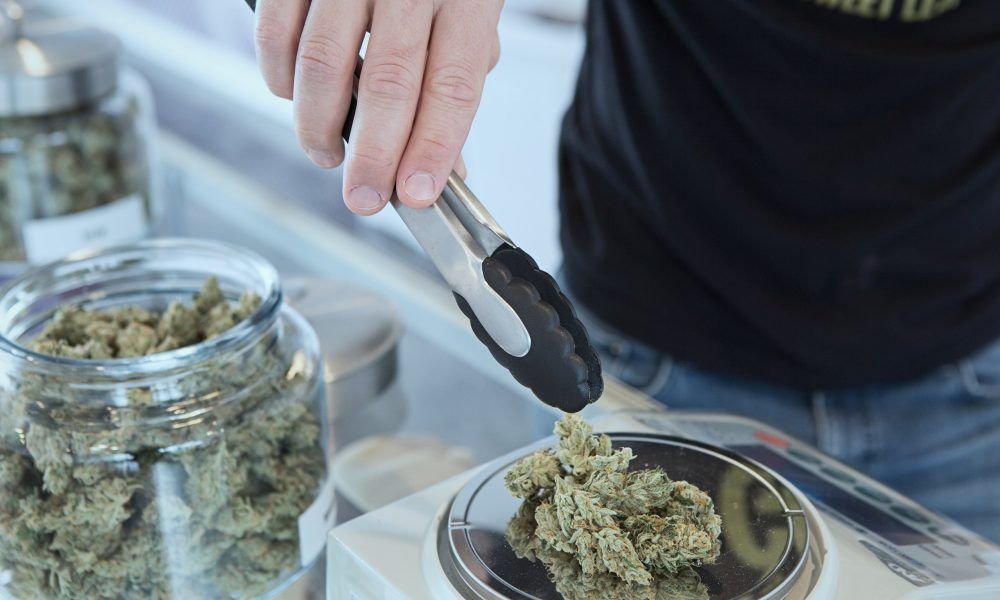Our Ladiesof thePerpetualHigh
Photographs by Yana Yatsuk
How a New Age order of feminist nuns is reimagining spiritual devotion and trying to heal the world — one joint at a time
By
CORRINE CIANI
DECEMBER 25, 2021
In the middle of
California’s Central Valley, in a modest milky-blue home on one acre of farmland, lives a small group of nuns. They wear habits and abide by a set of vows, but as the door opens, it’s clear that the Sisters of the Valley, as they’re known, aren’t living in a traditional convent. Because as the scent wafts out, it’s unambiguous: It’s the earthy, pungent smell of
weed.
When we visit, five women live in the home: Sister Kate, 62; Sister Sophia, 49; Sister Quinn, 25; and at the moment, Sister Luna and Sister Camilla, both 34, who are visiting from Mexico. Sister Kass, 29, lives off the property with her two children and her partner, Brother Rudy, the collective’s crop manager. On this sunny day, the Sisters of the Valley home is flooded with golden beams of light; a cream-colored piano stands against the wall with an ashtray and joint placed on top. Sister Kate picks it up, lights it, and thoughtfully inhales as she sits down to play “America the Beautiful.” She’s using a piano-learning app filled with Christian songs and national anthems — the two genres of music she dislikes the most. But there is an underlying motive: “The Christian kids nearby have contests, so if I do a lot of practicing in a month, then I can beat them,” she says with a raspy laugh. “There is some gratification in beating the Christian kids.”
The Sisters of the Valley are not a religious organization, but an enclave of self-proclaimed sisters who are in the business of spreading spirituality and selling healing cannabidiol products. “Look, the average age of a new Catholic nun in America is 78,” says Sister Kate, founder of the sect, which has 22 sisters and eight brothers worldwide. “Christianity is dying all around us. What are people going to do? They need spirituality in their life; we need it for meaning. We are very spiritual beings walking a physical path, and so for that reason we will find ways to connect. And we are just one example of that.”
Sisters Sophia, Camilla, Luna, Quinn, and Kate (from left) partake in their harvest, which is grown in California’s Central Valley. “One thing I love about Covid is nobody passes joints anymore,” says Sister Kate. “We roll, and we smoke our own joints — it’s a very personal thing.” She sees
cannabis as medicine: “If I could grow a bed of poppies, I’d figure out how to make that medicine.”
Yana Yatsuk
Their property is a peaceful setting, with ashtrays everywhere. There’s a craft yurt, vegetable beds of kale and spinach, a trailer where Sister Quinn resides, and tall potted cannabis plants, which were cultivated in a shed and planted outside in preparation for the upcoming full-moon harvest. (All of these are hemp, from which they extract CBD, but they also grow marijuana for personal use.) A secondary home on the property, known as the abbey, is used for medicine-making. The scent of their lavender salve consumes this space. The walls are lined with photos of nuns and female religious figures, some with joints, some without. Sister Sophia smiles as she stirs a pot on the stove, heating up their CBD topical salve before packaging it into jars. When it comes to their products, it is always referred to as medicine, not cannabis, and all steps from planting, to trimming, to packaging are scheduled around the moon cycle.

Sisters Luna, Sophia, Kate, Quinn, and Kass (from left) near their farm. “At this point, I feel like we’re all family,” says Sister Kass, a mother of two. “We basically do everything together.”
Yana Yatsuk
Born into a traditional Catholic upbringing, Sister Kate spent a considerable amount of her youth surrounded by nuns. Prior to founding Sisters of the Valley, she was a consultant, traveling to assist clients who were opening telecommunications and internet businesses. But as a single mother, she gave up her career, which had required her to be away from home. With an undergrad in business, a half-completed MBA, and extensive experience working with deregulating businesses, she looked toward the cannabis industry as a new frontier. She moved to the Central Valley and started a nonprofit cannabis collective in 2009, where she provided medical marijuana to local terminal patients.
According to Sister Kate, her fall into nunhood began in 2011, when the Obama administration lost a fight to have the Department of Agriculture declassify pizza sauce as a serving of vegetables in school lunches. “I said, ‘Oh, my God, if pizza is a vegetable, then I am a nun,’” she explains. Soon after, when she was planning to go to an Occupy protest, her nephew reminded her of a nun costume she had in her closet, and suggested she wear it. “When I protested with the Occupy movement dressed as a nun, people wanted me to organize myself into a religion and I kept saying, ‘No, this is meant to be crazy. This is meant to be a thumb at the establishment, that everything is broken in this country.’”
Sister Camilla, a co-founder of the Sisters of the Valley Mexico chapter.
Yana Yatsuk
During her years of protests against tuition hikes and budget cuts throughout California as a self-proclaimed nun, the question arose: What would a new order of nuns look like? “I thought everybody would think I was crazy because I was this single, self-declared sister, but really it sparked a debate about what a New Age order of nuns would look like if they were refounded today in this environment,” says Sister Kate. In August 2013, she was invited to a gathering of Native American tribes at the Tule River Reservation in the San Joaquin Valley. There, she talked to the women elders who held ancient knowledge of making medicine from plants. “When I came off of that mountain, I’m like, ‘Damn, I’m going to form my own sisterhood,’” she says.
Left: Sister Luna looks in on one of their grows. “We grow an eighth of an acre of weed during the long season,” says Sister Kate, but the order is looking to expand. Right: Sister Sophia with freshly potted cannabis.
Yana Yatsuk
Fifteen months later, she made a Weed Nuns Facebook page; she soon amassed 5,000 followers. In 2015, one of those adherents landed on her doorstep, declaring she would work for free. “I thought, ‘Huh, if four of us lived together and made medicine together, we could share our Netflix bill and I wouldn’t have to give up cable,’” Sister Kate says, so she went about starting a commune. “We didn’t want to be a religion. A religion forces you to be in the business of begging, and we know we can support ourselves. It had to be something that supported women ownership of businesses, and here we are. As it turns out, we end up looking like an ancient order called the Beguines.”
The sisters prepare for a moon ceremony. “We start our medicines on the new moon, and we finish our batch on a full moon,” explains Sister Kate. “As soon as we close out on a full-moon batch, we plan for the next. In between, we’re labeling, bottling, testing, and getting ready for shipping.”
Yana Yatsuk
A now-defunct religious order, the Beguines date back to the Middle Ages. Due to a multitude of unmarried women and a desire for spirituality, all-female groups found a way to live in devotion without officially joining a religious order. These women, who lived communally and supported themselves by making cloth or caring for the sick, stressed living like Christ; they were spiritual, and some even delved into mysticism. “We are not trying to romanticize the past, but there are things we like about it,” says Sister Kate. “It’s the way that these women worked in harmony with nature that we are trying to emulate.”
Part of the Sisters of the Valley business plan involves devoting their work and life to the cycles of the moon, which they believe is what their ancient ancestors did. Their harvest ceremony, which takes place during a full moon, begins with a reading from the “Book of the Beguines,” a pamphlet written by the enclave. “There’s no such thing as a ‘Book of the Beguines,’” Sister Kate confesses. “They were all burned. We make our own readings. We have to imagine what our ancestors would have said, what they would’ve done, and how they would have reacted to local political forces. Our closing prayer is from Season Four of
Game of Thrones,” she says, laughing.
Left: Sisters trimming weed from a recent harvest. Right: the sisters’ pajama party.
Yana Yatsuk
By afternoon, the Central Valley sun fills the craft yurt. Sister Kate takes a seat under the skylight to explain the meaning of their vows, represented by the acronym SOLACE: Service, Obedience, Living Simply, Activism, Chastity, and Ecology. Service relates to their work making plant-based medicine — cannabis, and more recently, mushrooms. “Obedience is not to any order or person but to organize our lives by the cycles of the moon,” Sister Kate says. Living simply, as she puts it with a smirk, “means
we can’t own a yacht — but
you can, and can invite us all to join you.” The fourth is activism, meaning holding local officials accountable.
Chastity, Sister Kate says, is not to be confused with celibacy. “Some people think that means you can’t do anything intimate, we can’t ever have a relationship, but that’s not true,” says Sister Quinn. “Our interpretation is that we are privatizing that part of our lives.” Ecology is for their intention to decrease their environmental footprint. And then, of course, there’s the full nun’s habit; it’s required on the farm, Sister Kate says, and is worn as a meditation to be in touch with their ancient mothers, to protect their hair and skin from medicine-making, and as a sign of respect for the plant that has been disrespected for hundreds of years.
Some of the Sisters practice a synchronized Tiktok dance at their pajama party as Sister Kass smokes a joint.
Yana Yatsuk
With tens of thousands of followers on TikTok and Instagram, their message is spreading. Sister Quinn, their social-content creator, is aiming to make them more accessible. As an eco-feminist who studied business economics at University of California, Merced, she believes in microeconomies and sustainable communities. “I know that some things need to be on a bigger level, but I think that people living in small communities and sharing the work — the gardening and living together — I think that that’s a really positive direction that we should be going in society,” says Sister Quinn. In regard to the enclaves’ focus on feminism, she says, “it’s more about realizing that women and female entities are more connected with the Earth. We are the healers, portals for life; we create everything. We like to have a certain amount of harmony, a certain amount of balance. Everyone does their part.”
As for how local officials feel about the enclave, it’s taken the Sisters of the Valley years to get in the good graces of the sheriff’s department. The sisters are regulars at city hall and have emphasized building a relationship with local authorities — with good reason, since they have yet to receive a business permit to grow hemp for profit. “They haven’t given me a permit, and I don’t think they ever are going to give me a permit,” says Sister Kate. “We are in our seventh year of operations and to shut us down, I think, they would have to take us before a judge, and I don’t think a judge would shut us down when we have 10 people working on a one-acre farm.”
Sisters Quinn, Kate, Sophia, Luna, and Camilla (from left) near the property.
Yana Yatsuk
Jobs in the Central Valley are far and few, so Sister Kate is set on expanding their business and creating work and leadership opportunities for women. As a small business having been left rocked by Covid-19, the sect is saving what they can and searching for a farm to be able to manufacture hemp on a larger scale, furthering Sister Kate’s goal of hiring more of her local community and advancing her spiritually charged, cannabis-laced mission. “The idea is that the sisters set up their own business, set up their own commerce, have their own store,” she says. “[They] start out by earning either through wholesale or as an agent, but always plan to be making their own medicine and having their own little territory.… Everything about us is about female empowerment: women owning property, and women making the rules.”










 . She would wait at the backdoor for me to toss them. Now I toss them in the garbage . She still waits for me when I'm baking though
. She would wait at the backdoor for me to toss them. Now I toss them in the garbage . She still waits for me when I'm baking though  .
.





